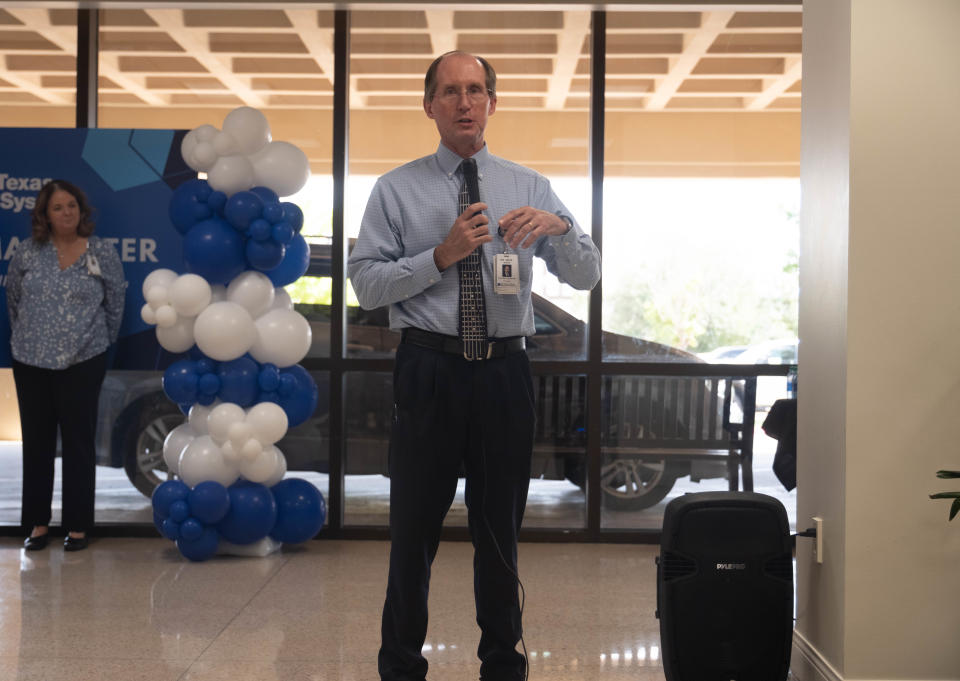Dr. Weis talks about his new role with TTUHSC
Dr. Brian Weis, former chief medical officer at Northwest Texas Healthcare System (NWTHS), spoke about his departure from the hospital to take over as the interim regional dean for the Texas Tech University Health Sciences Center (TTUHSC) School of Medicine in Amarillo.
Weis has been with NWTHS for the last eight years until his official departure in April and has been instrumental in guiding the hospital to its recent certification as a Level II Trauma Center.
Due to the recent turnover in deanship with the School of Medicine in Lubbock due to the passing of Dr. Steven Berk in May and Dr. Richard Jordan retiring as dean from the School of Medicine in Amarillo, a position he has held since 2007, Weis is now serving in his stead.

According to Weis, TTUHSC is looking to fill both positions, and if both parties are happy, he hopes to have the interim title removed and serve as the school’s dean.
“This is really my background; outside of the eight years that I was the chief medical officer at Northwest, I have always been in academic medicine,” Weis said. “When I was in Dallas, I spent 17 years at the University of Texas Southwestern, with about five of those years being on the faculty there teaching residents and students.”
He said he was recruited to Amarillo in 2005 to become the program director for the internal residency program at TTUHSC. In 2015, he was named the chief medical officer at NWTHS.

“That was a departure of what I was used to, and so after these years, I decided to go back into academics now,” Weis said. “I really missed teaching, and entering the latter part of my career, I really thought this was the place that I could have the most impact.”
With the recent certification of NWTHS as a Level II trauma center, Weis said that he is proud of all the hospital did in its partnership with TTUHSC to reach this critical threshold that will benefit the entire Texas Panhandle.
According to Weis, his main component in helping the hospital reach that certification was recruiting the physicians needed to reach this point. He said that he was heavily involved in recruiting the orthopedic trauma and vascular surgeons required to become a Level II trauma center.
He said a vast majority of the work to reach this level of certification was done by his colleagues in the administration being able to get the operations of the hospital up to this standard. Many of the measures involve specialty doctors in trauma who can take patients to an operating room within 15 minutes of receiving at any time of the day, along with multiple other requirements for training and service.
The advancements in the level of care at both NWTHS and BSA are products of being part of the Texas Tech Department of Surgery, which provides trauma surgeons at both hospitals. BSA recently moved up to a Level III trauma center. With the Master of Service’s agreement that TTUHSC has with the hospitals, the staffing level is greatly enhanced and helps both hospitals provide more outstanding care for the community.
“These certifications are largely because of the efforts of the Texas Tech Surgery Department,” Weis said. “This partnership is critical to both hospitals for their staffing and expertise. These surgeons fill critical roles in these area hospitals."
Asked if his move back to TTUHSC will be a benefit in helping NWTHS to become a Level I trauma center, Weis said that he hopes to be a bridge in strengthening the relationship between the hospital and the university.
“Thankfully, now I have the unique view on knowing how both sides of the culture work with my hospital experience and academic background,” Weis said. "I have an opportunity with my role to advocate for both facilities to continue to work closer together with their collaborations.”
Weis said that the most challenging part of reaching Level I for a hospital is having the research facilities and doing the dedicated research necessary. He said in his current position, he has been working with the two teaching teams, doing rounds with them at both hospitals and lecturing students on topics pertinent to internal medicine.
“My particular specialty is taking care of patients living with HIV, so I give lectures on HIV treatment along with other lectures on general internal medicine,” Weis said.
With the taking of this position, Weis said that academia can extend the longevity of his medical career, as he hopes to teach in some capacity as long as he is physically able.
A practicing physician since 2000, Weis said that he learned a great deal during his time as a resident from much of the AIDS crisis when it was at its worst. He said that the strides in medicine and medication have made the virus undetectable in the bloodstream since that time.
“Previously, HIV patient care centered around taking three different medications due to the rapid mutation of the virus; now they have put these three drugs that have integrated into one, which is taken once a day,” Weis said. “That is where we are at this point, and if HIV patients take this pill for the rest of their life, they will not succumb to the effects of the virus. While people are not cured and if they stop taking the medicine, they will begin to regress, this medication allows people with this virus to live everyday lives without contracting AIDS."
Regarding the university's focus in his new role, Weis said that the university and its auxiliary hubs are working on a comprehensive plan. With five of the six schools that are under the Texas Tech banner in Amarillo, including nursing, veterinary, medicine, pharmacy and health and occupational health schools, the city is a major focus for the university in providing health care providers for the state.
“We have room to expand here in Amarillo, so the thing is they are looking at plans to expand the campus, how can we make it a better resource for the community in terms of critical care, and how can we expand research capabilities here,” Weis said. “We want to coordinate these different schools to create a team setting so that when patients come here, they are cared for by a team of experts, not just a single doctor. These are the priorities for the coming year. We want to be the future of health by creating this multidisciplinary team setting for patients to come to.”
With the research facilities that are created by TTUHSC and its relationship with local hospitals, Weis said that this relationship really pushes for the university to be on the forefront when it comes to training its doctors.
“What this means for the community is some of the most up-to-date progressive care teams that you can find taking care of them,” Weis said. "Some areas like Dallas have no issue recruiting doctors, but these medical collaborations we have locally allow an opportunity to grow our doctors. This is our opportunity to train them well and have them serve our communities in all these roles.”
This article originally appeared on Amarillo Globe-News: Dr. Weis speaks about his transition to TTUHSC interim dean

